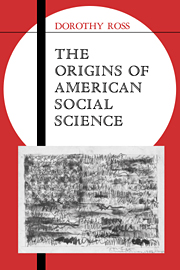Book contents
- Frontmatter
- Contents
- Acknowledgments
- Abbreviations used in the footnotes
- Introduction
- Part I European social science in antebellum America
- Part II The crisis of American exceptionalism, 1865–1896
- Part III Progressive social science, 1896–1914
- Part IV American social science as the study of natural process, 1908–1929
- Epilogue
- Bibliographical note
- Indexes
- Ideas in Context
Epilogue
Published online by Cambridge University Press: 23 September 2009
- Frontmatter
- Contents
- Acknowledgments
- Abbreviations used in the footnotes
- Introduction
- Part I European social science in antebellum America
- Part II The crisis of American exceptionalism, 1865–1896
- Part III Progressive social science, 1896–1914
- Part IV American social science as the study of natural process, 1908–1929
- Epilogue
- Bibliographical note
- Indexes
- Ideas in Context
Summary
To trace the “origins” of American social science to 1929 is in some ways an arbitrary exercise, for its history is a continuing development before and after that date. But 1929 takes us far enough into that history to recognize both the continuing characteristics of American social science and its distinctive twentieth-century features.
My intention has been to historicize American social science, to show that its effort to naturalize the historical world is itself a historical project. To say this is to deny its positivist self-description as objective science. Like John Dewey, I use this historical strategy with “malice prepense,” but I am aware that positivists are well armed to slough it off. In science, they say, there is no connection between the context of discovery and the context of verification. Even if that were true, and I do not believe it is, it assumes for the social sciences precisely what is in question; namely, the likeness of its practice to the natural sciences.
What my history shows is that American social science has consistently constructed models of the world that embody the values and follow the logic of the national ideology of American exceptionalism. The exceptionalist vision has continually responded to the changes of history itself, and it has been open to a considerable variety of disciplinary interests, political purposes, and personal experiences. But the exceptionalist stance has withal produced remarkable continuities within and across these disciplines.
- Type
- Chapter
- Information
- The Origins of American Social Science , pp. 471 - 476Publisher: Cambridge University PressPrint publication year: 1990

